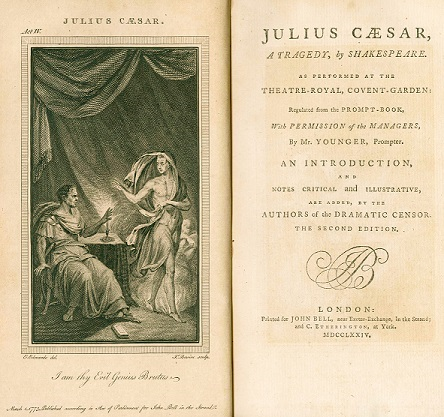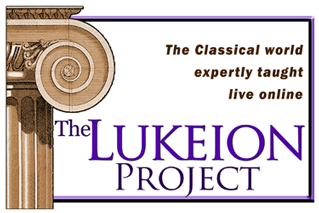The Classical Bard:
Shakespeare's Greeks & Romans
 The Bard of Avon loved Classical themes almost as much as we do here at The Lukeion Project. Get ready to visit some of his very best pieces in this one semester course. We will cover Shakespeare's Roman plays (Julius Caesar, Antony and Cleopatra, and Corilanus) plus a Midsummer Night's Dream set in Athens. Along the way we will examine how ancient writers influenced Shakespeare's ideas. Expect exams and writing projects. There will be group reading so a microphone is required.
The Bard of Avon loved Classical themes almost as much as we do here at The Lukeion Project. Get ready to visit some of his very best pieces in this one semester course. We will cover Shakespeare's Roman plays (Julius Caesar, Antony and Cleopatra, and Corilanus) plus a Midsummer Night's Dream set in Athens. Along the way we will examine how ancient writers influenced Shakespeare's ideas. Expect exams and writing projects. There will be group reading so a microphone is required.
Top Five Reasons to Study Shakespeare
- Shakespeare is writing about universal human experience. He eloquently and profoundly sums up the range of human emotion. If you’ve felt it, Shakespeare has described it.
- He’s a remarkable storyteller. He was able to take material from other sources, such as Plutarch’s history, and turn it into plays that people have loved for 400 years. His range covers tragedy, comedy, love stories, fairy tales, histories and melodrama. He just knows how to tell a good tale.
- Shakespeare’s characters are deep and complex. They are among the favorites for actors to perform because they are emotionally rewarding. From Brutus trying to make the correct decision for Rome to Puck commenting on what fools these mortals be, the characters have a depth of humanity rarely seen in drama.
- The sheer beauty of the language draws people back to Shakespeare again and again. There’s a reason that Shakespeare is still the most often quoted English author. His ability to turn emotion into words is unsurpassed. His ability to coin new phrases that are still in use and his creation of around 1700 new words show his mastery of language. Shakespeare is one the driving forces in the way English is used today.
- He is a cultural icon. A well-educated person is presumed to have a grasp of Shakespeare. Just as knowledge of The Iliad and The Odyssey are foundations of a classic liberal arts education, familiarity with Shakespeare is a mark of a thoughtful scholar. Homer, Shakespeare and the Bible were the basis of most of the early education in America.

The Lukeion Project takes an interdisciplinary approach to Shakespeare
Along with reading the four plays chosen for this class, there will be a short writing project over each play. These will be of a literary nature such as close readings and character studies rather than research papers. Each project will be 2-3 pages. There will also be a reading quiz before each play. In class we will read sections of each play out loud with students taking different parts. Please have a microphone so that you can take your turn. We will have 2 test that will cover the plays as well as the other information covered in class such as details of Shakespeare's life, the Elizabethan theater and ancient sources used by Shakespeare. I know many of you have studied the historical Julius Caesar and other characters in these plays. We will be discussing the literary Julius Caesar. We may talk about the differences between the historical and the literary characters but we will be focused on the plays so keep the literary figures in mind during discussions.
College Preparatory
 Our literature survey courses are both college preparatory. They promote time management and encourage critical analysis in exam essays and research projects. They prompt good note taking and study skills. Good candidates for this course must be confidently reading and writing at the high school level since both courses require robust weekly reading assignments. The instructor will provide suggestions and pointers for first time research writers and note takers.
Our literature survey courses are both college preparatory. They promote time management and encourage critical analysis in exam essays and research projects. They prompt good note taking and study skills. Good candidates for this course must be confidently reading and writing at the high school level since both courses require robust weekly reading assignments. The instructor will provide suggestions and pointers for first time research writers and note takers.
Writing projects take time, even if they are short writing projects. I will expect a draft a week before the project is due to ensure that you are not waiting until the last minute to write your papers and that you are fulfilling the expectations of the project. What to expect each week: 1. Complete weekly required reading 2. Take online reading quizzes 3. Submit paper topic worksheets, rough drafts and completed drafts on time. 4. Attend weekly live sessions 5. Participate by asking great questions and offering opinions and answers when asked and by taking your turn as an “actor” when asked by the instructor.
Required Materials for this Course
Many of you probably have some Shakespeare texts already. Many homes have a complete Shakespeare and some of these are great but many are merely decorative and difficult to read. They quite often do not have line numbers. The texts I will require are separate books so that they are easier to handle than the 1754-page Shakespeare text that I was required to use in college and they have the line numbers. As we get closer for this course to start, I will send out a list of books to be purchased.
Recommended ages: 16-18+
We offer a single time slot for this course which is strictly limited in size:
- Spring semester, Thursdays at 2:15 PM ET
-- instructor R. Baty

